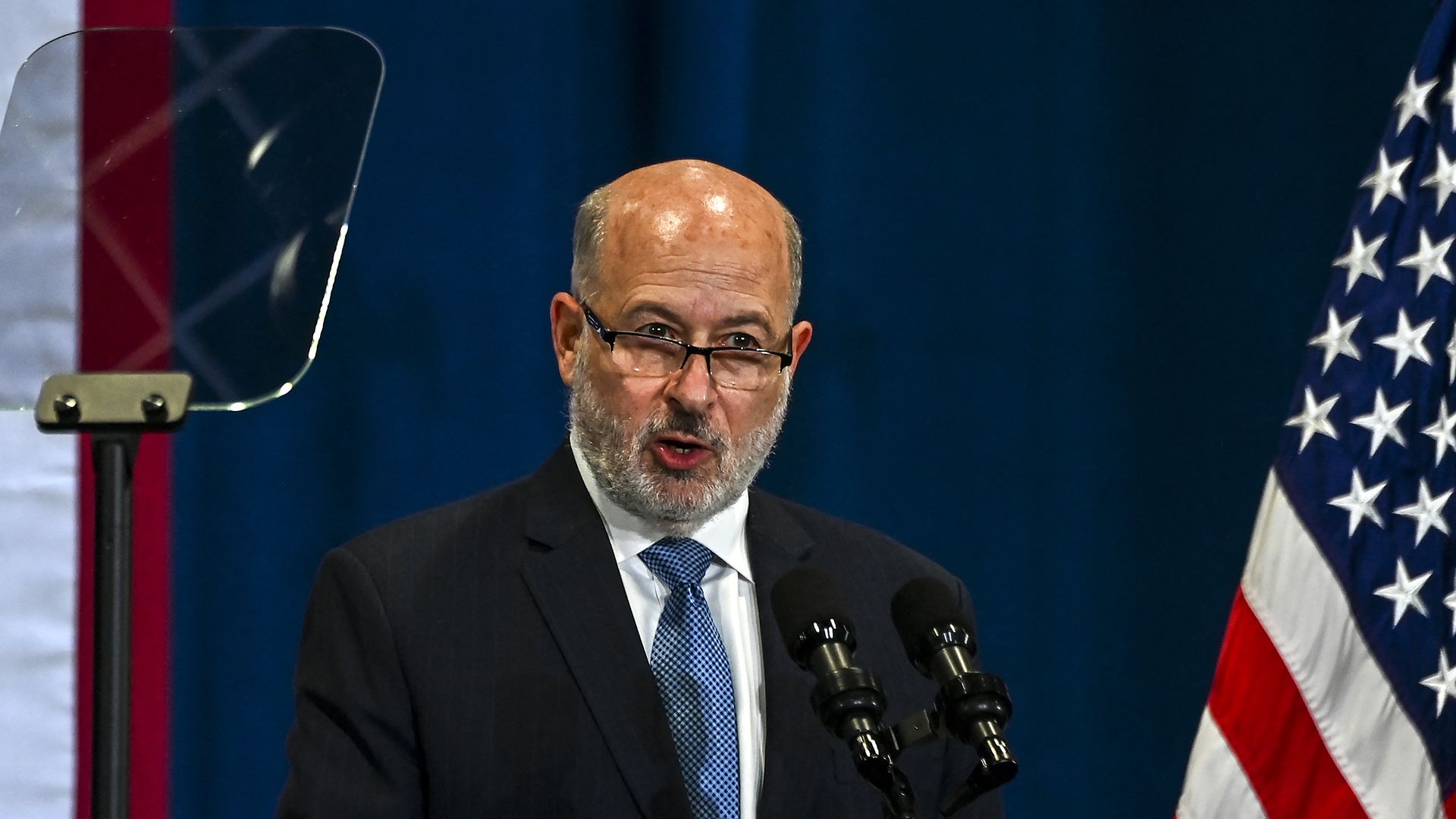NOAA Administrator Rick Spinrad speaks at an event at Florida International University in Miami on Aug. 1, 2022. Photo: Chandan Khanna/AFP via Getty Images
NOAA administrator Rick Spinrad is leaving the federal atmosphere and oceans agency at an uncertain, increasingly stormy time.
Why it matters: In an exit interview with Axios, Spinrad said NOAA’s services — from weather forecasting to climate research and space weather warnings — have never been more important and economically valuable.
Yes, but: Project 2025, a blueprint for President-elect Trump’s second term, calls for radical measures, including breaking the 12,000-federal employee agency up and all but eliminating its climate research.
- It also calls for privatizing the National Weather Service.
- Trump hasn’t endorsed those particular steps, though he has nominated numerous report contributors to his new administration.
Zoom in: Spinrad, an oceanographer by training, frames NOAA as a “national environmental intelligence agency,” which provides information and products ranging from fisheries health to climate change.
- Under the Biden administration, NOAA has benefited from investments in its cloud and supercomputing facilities, boosts to coastal resilience spending and other extreme weather and climate adaptation and forecasting work.
- This positions it to provide even more accurate forecasts in the future, Spinrad said.
The intrigue: He cites the “Climate Ready Nation” initiative as one of his tenure’s biggest achievements. It seeks to establish NOAA as “the primary federal authoritative provider of climate information and services” across the government.
- This program, he told Axios, demonstrates “how you can take some of the most fundamental science and translate it into getting ahead of the challenges of climate change and making lives more productive, safer, and building whole new industries.”
- He said much more work is needed, however: “In some cases, we’re seeing 30 times as much demand for what we can do as we have resources for.”
- That demand is coming from the public, state and local agencies, and other parts of the federal government.
State of play: NOAA also is responsible for issuing fire weather forecasts, both nationally and locally, and warned about the dangers in the Los Angeles area at least two days in advance of this week’s fires.
Between the lines: NOAA has long been an awkward fit within the Commerce Department, the product of an argument between then-President Richard Nixon and his Interior secretary.
- Restructuring the agency has been proposed before, including by President Obama, but has always run into a buzzsaw on Capitol Hill.
- Some on the Hill support making it an independent agency.
Zoom out: NOAA has struggled to point to its economic impacts. But Spinrad said that for a small agency, it has a big taxpayer payoff.
- “If you look at NOAA’s budget, it costs every American six cents per day to get the products and services we get,” he said.
- He cited hurricane intensity and tornado warnings as one such life-saving feature: “To individuals, it affects their decisions they make about what they’re going to do every day, but more importantly, perhaps it’s the impact that it has on everything from agriculture to energy to commerce to transportation to health.”
- He also described some of NOAA’s value as coming in the form of “cost avoidance,” such as averting power outages and flight delays from an unforeseen solar storm.
- “By any measure, the return on investment is orders of magnitude, at least 10-to-1 on all of these kinds of activities.”
What’s next: When asked about the uncertainty surrounding NOAA’s future, Spinrad noted that even if the agency were to change or fold, the federal government would still need to carry out its functions.
- “We would have to create a government function to protect the people from these kinds of environmental phenomena,” he said, citing tornadoes, wildfires and other hazards.
Our thought bubble: Even if it avoids hitting political turbulence, the agency faces daunting tasks in the next few years.
- They include updating the nation’s network of radars; aging telecommunications equipment; integrating AI weather forecasting even more; and taking new hurricane-hunting research planes to the sky.
- Meanwhile, climate change impacts will only become more severe.

